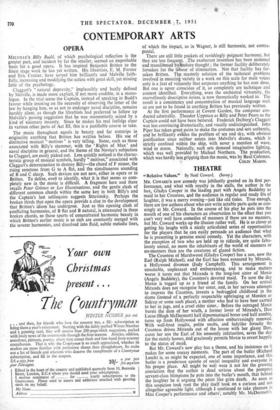CONTEMPORARY ARTS
OPERA
MELVILLE'S Billy Budd, of which psychological reflection is the greater part, and incident by far the smaller, seemed an improbable basis for a good opera. It has inspired Benjamin Britten to the finest stage work he has yet written. His librettists, E. M. Forster and Eric Crozier, have served him brilliantly and Melville ,faith- fully, increasing and modifying the action with great skill, yet missing little of the psychology.
Claggart's "natural depravity," implausibly and hazily defined by Melville, is made more explicit, if not more credible, in a mono- logue. In the trial scene the Captain, instead of speaking in Budd's favour while insisting on the necessity of observing the letter of the law by hanging him, so as not to endanger naval discipline, remains harshly silent, as though the librettists had preferred to follow up Melville's passing suggestion that he was momentarily seized by a kind of visionary insanity. Since he makes his real feelings clear in various other_ parts of Act III, this is a justifiable course to take.
The music throughout equals in beauty, and far outstrips in originality anything that Britten has written before. His use of distinctive musical " motives " is very telling. Some, such as those associated with Billy's stammer, with the Rights of Man' and naval discipline in general, and the theme of the Novice's subjection to Claggart, are easily picked out. Less quickly noticed is the charac- teristic group of musical symbols, hardly "motives," associated with Claggart's determination to destroy Billy—the chord of F minor, the rising semitone from G to A flat, and the simultaneous sounding of B and C sharp. Such devices are not new, either in opera or in Britten. To define, eve to identify, what it is that seems so com- pletely new in the music is difficult. A fragment here and there ree4lls Peter Grimes or Les Illuminations, and the gentle clash of different common chords within the same key in both Billy's and the Captain's last soliloquies suggests Stravinsky. Perhaps the broken thirds that open the opera provide a clue to the development that Britten's idiom has undergone. Just as this opening clash of conflicting harmonies, of B flat and B natural, is attenuated in these broken chords, so those spurts of concentrated harmonic beauty in which Britten's earlier music is so rich are constantly merged with the severer harmonies, and dissolved into fluid, subtle melodic lines,
of which the impa,ct, as in Wagner, is still harmonic, not contra- puntal.
There are still little pockets of ravishingly poignant harmony, but they are less frequent. -The exuberant invention has been stemmed and transatmed b.5*iture thought ; the former facility deliberately forsaken for the lifbour of elimination. Not that facility has for- saken Britten. Thp masterly solution of the technical problems involved in ensuring variety in a work on this scale for male voices only is a feat of virtposity that surpasses anything he has ever done. But one is river conscious of it, so completely are technique and content identified. Everything, even the orchestral virtuosity, the marvellously descriptive noises, is now thematically worked in. The result is a consistency and concentration of musical language such as are not to be found in anything Britten has previously written.
At the first performance at Covent Garden, the composer con- ducted admirably. Theodor Uppman as Billy and Peter Pears as the Captain could not hive been bettered. Frederick Dalberg's Claggart was less convincing -dramatically, and vocally undistinguished. John Piper has taken great pains to make the costumes and sets authentic,
• and he brilliantly evides the problem of sea and sky, with obvious justification since neither enters into Melville's drama, which is strictly confined within the ship, with never a mention of wave, virind or storm. Naturally, such sets demand imaginative lighting, which was well provided by Michael Northern. The production, which was hardly lest gripping than the music, was by Basil Coleman.
COLIN MASON.


















































 Previous page
Previous page